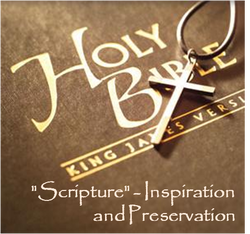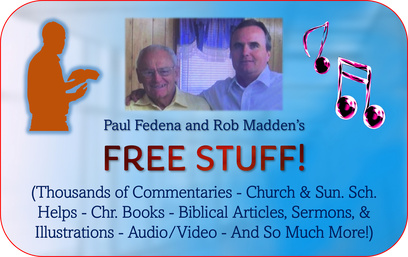“Scripture” – Inspiration and Preservation by Paul Fedena

1. The word “scripture(s)” is used over 40 times in the Bible, and never refers to the autographs or “originals” one time.
2. In 2 Tim.3:15 Paul speaks of Timothy having had in his home the “holy scriptures” (O.T.) since he was a child.
a. Timothy did NOT have the autographs or the original MSS.
b. He either had a COPY or a TRANSLATION (since he probably spoke Greek).
3. In the very next verse “all scripture” is said to have been inspired.
a. Either there are two different “scriptures” or the “writings” (graphe) he had were inspired.
b. I assume that Paul wasn’t referring to 2different “scriptures” & if that is so he wasn’t speaking of the “originals.”
4. The scriptures Paul referred to were “holy” – even if they were not the originals.
5. If God breathed on the scriptures Paul was referring to, that would mean that God not only “inspired” the autographs, but in some fashion continued to “breathe” on whatever Bible Timothy had. God is alive and still breathes!
6. ”Theopneustos” can either be viewed in a very limited technical sense which confines it to the autographs (which means that Timothy had the original MSS), or it can mean that God hasn’t stopped breathing on His Word (and words) so that in preservation, His breath in some fashion is upon accurate copies and/or translations.
7. The term “inspired” then can either be used only of the autographs (if you believe that God only breathed on the original Greek and Hebrew letters and words) or that in preservation, He continues to superintend over copies and translations. (I don’t believe God only meant to preserve His words in Hebrew & Greek or that God has stopped breathing).
8. If in a Bible college venue or formal theology class you want to restrict the word ”inspiration “to the autographs, that is fine, but since God declares in Heb. 4:12 that the word of God is “quick” or alive I assume that it still has God’s breath, spirit and life upon it in some measure, since only life can produce life.
9. The word is also spoken of as “incorruptible seed,” and I do not believe that only refers to the originals; “seed” produces life. We don’t have a “dry bones” Bible, we have a truly living Bible. Our Bible is not dead, the flower has not faded, and the sword is as sharp as when it was first whetted.
10. When I hold up a King James Bible and declare that it is the preserved, infallible Word and words of God, I am inferring that it has God’s breath upon it; otherwise it is dead like any other book.
11. All of this begs the question as to the authority, credibility and accuracy of the King James Bible. Do we have an infallible, inerrant Bible that we can honestly refer to as “the words and Word of God” (verbal & plenary)?
a. Ask those who believe that only the originals were inspired to hand you a copy of the inerrant Bible they claim to have and they can’t do so, since they do not have the autographs.
b. Ask me or any other Bible-believer for a copy and they will hand you a King James Bible.
12. Of course we do not have all the answers as to the method of inspiration or preservation, but we are a people of faith and should not care what our critics or “intellectuals” say about us being obscurantist. The boldness of faith of Peter and John brought the accusation that they were ignorant and unlearned men from the same crowd. Acts 4:13
2. In 2 Tim.3:15 Paul speaks of Timothy having had in his home the “holy scriptures” (O.T.) since he was a child.
a. Timothy did NOT have the autographs or the original MSS.
b. He either had a COPY or a TRANSLATION (since he probably spoke Greek).
3. In the very next verse “all scripture” is said to have been inspired.
a. Either there are two different “scriptures” or the “writings” (graphe) he had were inspired.
b. I assume that Paul wasn’t referring to 2different “scriptures” & if that is so he wasn’t speaking of the “originals.”
4. The scriptures Paul referred to were “holy” – even if they were not the originals.
5. If God breathed on the scriptures Paul was referring to, that would mean that God not only “inspired” the autographs, but in some fashion continued to “breathe” on whatever Bible Timothy had. God is alive and still breathes!
6. ”Theopneustos” can either be viewed in a very limited technical sense which confines it to the autographs (which means that Timothy had the original MSS), or it can mean that God hasn’t stopped breathing on His Word (and words) so that in preservation, His breath in some fashion is upon accurate copies and/or translations.
7. The term “inspired” then can either be used only of the autographs (if you believe that God only breathed on the original Greek and Hebrew letters and words) or that in preservation, He continues to superintend over copies and translations. (I don’t believe God only meant to preserve His words in Hebrew & Greek or that God has stopped breathing).
8. If in a Bible college venue or formal theology class you want to restrict the word ”inspiration “to the autographs, that is fine, but since God declares in Heb. 4:12 that the word of God is “quick” or alive I assume that it still has God’s breath, spirit and life upon it in some measure, since only life can produce life.
9. The word is also spoken of as “incorruptible seed,” and I do not believe that only refers to the originals; “seed” produces life. We don’t have a “dry bones” Bible, we have a truly living Bible. Our Bible is not dead, the flower has not faded, and the sword is as sharp as when it was first whetted.
10. When I hold up a King James Bible and declare that it is the preserved, infallible Word and words of God, I am inferring that it has God’s breath upon it; otherwise it is dead like any other book.
11. All of this begs the question as to the authority, credibility and accuracy of the King James Bible. Do we have an infallible, inerrant Bible that we can honestly refer to as “the words and Word of God” (verbal & plenary)?
a. Ask those who believe that only the originals were inspired to hand you a copy of the inerrant Bible they claim to have and they can’t do so, since they do not have the autographs.
b. Ask me or any other Bible-believer for a copy and they will hand you a King James Bible.
12. Of course we do not have all the answers as to the method of inspiration or preservation, but we are a people of faith and should not care what our critics or “intellectuals” say about us being obscurantist. The boldness of faith of Peter and John brought the accusation that they were ignorant and unlearned men from the same crowd. Acts 4:13




